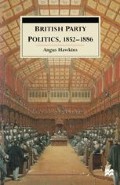Abstract
The exuberant energy of the 1868–74 ministry marked the heady flush of Gladstonian Liberalism in power. The extensive legislative achievement of this government indicated the broad sweep of opinion and powerful reforming impetus embraced within the progressive movement of Liberal belief. The Church of Ireland was disestablished, an Irish Land Act passed, elementary education reformed, competitive examinations for entrance to most areas of the civil service introduced, the purchase of military commissions abolished, the judicial system overhauled, religious tests for Oxford and Cambridge Universities abolished, local government reformed, and the secret ballot introduced for parliamentary elections. Between 1869 and 1873 major areas of British society were overhauled. The ties between the state and the Established Church were loosened, the patronage system was reformed, and greater efficiency and professionalism were sought within the framework of economic government. By 1873 the Liberal party was tearing itself apart as Gladstone’s leadership faltered. But for the first three years of its existence Gladstone’s government proved itself, arguably, the greatest reforming ministry of the century.
Preview
Unable to display preview. Download preview PDF.
Notes
W.E. Gladstone, A Chapter of Autobiography (1868) p. 58.
J. Morley, Life of Gladstone, 3 vols (1906) ii, p. 252; Gladstone diary, 29 December 1868, Gladstone Diaries, vi, p. 654.
See H. C. G. Matthew, Gladstone, 1809–1874 (1986) pp. 142–8.
See J. Parry, Democracy and Religion: Gladstone and the Liberal Party, 1867–1875 (1986) p. 272.
Trelawny diary, 16 February 1869, T. A. Jenkins (ed.), The Parliamentary Diaries of Sir John Trelawny, 1868–73, Royal Historical Society Camden Fifth Series, 3 (1994) p. 345.
T. A. Jenkins, The Liberal Ascendancy, 1830–1886 (1994) pp. 126–7.
See E. D. Steele, Irish Land and British Politics (1974).
Derby Journal, 17 February 1870, The Diaries of the 15th Earl of Derby, 1869–1878 Camden Fifth series, vol. 4 (1994) p. 50.
See J. Parry, The Rise and Fall of Liberal Government in Victorian Britain (1993) p. 269.
Derby Journal, 29 May 1870, Diaries of Derby p. 60.
J. Winter, Robert Lowe (1976) p. 248.
Richard Shannon, The Age of Disraeli, 1868–1881: The Rise of Tory Democracy (1992) p. 153.
Maurice Cowling, 1867: Disraeli, Gladstone and Revolution (1967) p. 101.
A. G. Gardiner, The Life of Sir William Harcourt 2 vols (1923) i, p. 270.
H. Reeve, ‘Plain Whig Principles’, Edinburgh Review ( January 1880) p. 279.
Copyright information
© 1998 Angus Hawkins
About this chapter
Cite this chapter
Hawkins, A. (1998). Gladstone and Liberalism, 1868–74. In: British Party Politics, 1852–1886. Palgrave, London. https://doi.org/10.1007/978-1-349-26167-3_6
Download citation
DOI: https://doi.org/10.1007/978-1-349-26167-3_6
Publisher Name: Palgrave, London
Print ISBN: 978-0-333-57081-4
Online ISBN: 978-1-349-26167-3
eBook Packages: Palgrave History CollectionHistory (R0)

